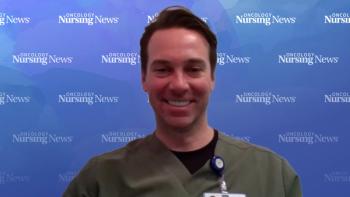
- September 2017
- Volume 12
- Issue 7
Thyroid Cancer Is Rising Faster Than Any Other Cancer
With the rate of diagnosis growing, oncology nurses play a key role in detecting the disease in early stages by becoming familiar with signs and symptoms.
Recent headlines have noted that the incidence of thyroid cancer is rising faster than any other type of cancer in the United States, and that the rate of Americans receiving the diagnosis has more than tripled over the past 4 decades. At first glance, the rise in cases may be attributable to improved screening and detection of this uncommon cancer, which affects 56,870 people annually in the United States and causes about 2000 deaths. However, researchers note that the increasing incidence of thyroid cancer is, in fact, consistent with a true uptick in the occurrence of the disease.
Interestingly, about 74% of thyroid cancers occur in women. While clinical studies of estrogen, progesterone, and other hormones as causative factors for thyroid cancer have been inconclusive, experimental studies of thyroid cancer cell lines suggest that an imbalance among estrogen receptor isoforms may be responsible for cell proliferation, including the development of thyroid cancer.
Although more common in women, thyroid cancer typically presents at a more advanced stage and with a worse disease prognosis in men. Male patients typically present with larger tumors that are more likely to have extended beyond the thyroid gland and, in some cases, that have metastasized to local lymph nodes and more distantly.
Most individuals who develop thyroid cancer do not have an inherited condition or a family history of the disease. However, having a first-degree relative with thyroid cancer, even without a known inherited syndrome in the family, increases a person’s risk. About 20% of medullary thyroid carcinomas result from RET gene mutations and are known as familial medullary thyroid carcinomas (FMTCs). These cancers often develop during childhood or early adulthood and tend to metastasize early.
Higher rates of thyroid cancer also occur among people with uncommon genetic conditions. For instance, those with familial adenomatous polyposis have defects in the APC gene and develop polyps in the colon, which increase their risk of colon cancer. They also have an increased risk of other cancers, including papillary thyroid cancer. People with Cowden syndrome have mutations in PTEN, a tumor suppressor gene that disrupts the PTEN protein and results in hyperactivity of the mTOR pathway. Consequently, they have an increased risk of thyroid-related problems and papillary or follicular thyroid cancer. Those with Carney complex type I (caused by defects in the PRKAR1A gene) also have an increased risk of papillary or follicular thyroid cancer.
Other risk factors for thyroid cancer include a diet low in iodine (rare in the United States) and radiation exposure. Sources of radiation exposure include radiotherapy and fallout from power plant accidents. Head and/or neck radiation treatments during childhood also increase the risk of thyroid cancer, and this risk increases with larger doses. As people with cancer are living longer, they are vulnerable to developing second cancers, such as thyroid cancer.
Childhood cancer survivors who received radiation therapy to the head or neck should be followed and assessed for thyroid cancer signs and symptoms. Patients with genetic disorders that increase their risk of thyroid cancer and family members of patients with FMTCs may require thyroid hormone blood testing, ultrasound exams of the thyroid, and genetic counseling.
Unlike other types of cancer, there is no recommended screening test to find thyroid cancer early. More often it is found when patients see their doctors because of neck lumps or nodules they noticed.
This is why is it crucial for oncology nurses to be familiar with the signs and symptoms of thyroid cancer as we perform patient assessments, interact with family members, and conduct community cancer screening programs.
Thyroid cancer can cause a lump, swelling, or pain in the neck; hoarseness or other voice changes; difficulty swallowing or breathing; or a persistent cough not caused by a cold or other infection.
Tarek El Moussa, star of HGTV’s Flip or Flop, was diagnosed with stage Ⅱ thyroid cancer in 2013 after a registered nurse watching the home improvement show became concerned about his large thyroid and e-mailed the show’s production company.
If found early, thyroid cancer can be treated successfully. And, most thyroid cancers can be cured if the disease hasn't spread to distant parts of the body. Patients can work with their medical team to come up with the best treatment plan for their stage and health.
With thyroid cancer on the rise, nurses everywhere now play a role in its early detection.
Articles in this issue
about 8 years ago
What Are Professional Boundaries and Why Do They Matter?about 8 years ago
Helping Patients Manage Work-Life Balance During and After Treatmentabout 8 years ago
CIPN Experienced by Many Patients Years After Treatmentover 8 years ago
Proton Therapy: The New Weapon to Fight Cancerover 8 years ago
Immunotherapy Is Rapidly Changing Nursing Practiceover 8 years ago
Revolutionizing Oncology With CAR T-Cell TherapyNewsletter
Knowledge is power. Don’t miss the most recent breakthroughs in cancer care.




















































































